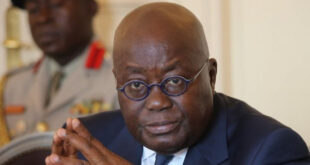Government is engaging in $1.25 billion in foreign borrowing from commercial lenders this year to finance its projects and programmes.
This is adding to the country’s public debt since these monies are not being used for refinancing of already existing debt.
The new borrowing consists of $750 million out of the recently issued $2.5 billion in Eurobonds and a further$500 million being borrowed from other commercial lenders.
The debt is exclusive of the $1.3 billion syndicated loan being taken to finance cocoa purchases from farmers, which is a self-amortizing loan and therefore does not actually add to the public debt.
The new borrowing on commercial terms is within the ceiling agreed between government and the International Monetary Fund with whom it is engaged in a three year Extended Credit Facility programme that will expire at the end of this year.The agreement has a cumulative net foreign borrowing ceiling of US$3.5 billion for the period 2015 to 2018.
The major part of the Eurobond issuances done so far within this period has been used for refinancing of existing debt – including US$1.75 billion from the latest issuance – and so did not count as new net borrowing.
Government’s large net foreign borrowing for 2018 has become necessary in the face of major cuts to its capital budgetary expenditure on development projects both last year and this year as it seeks to match expenditures with revenues so as to reign in the fiscal deficit.
The new borrowing is thus being used primarily for capital projects, particularly on infrastructure, and the particular projects to receive financing from the new borrowing have been agreed with the IMF itself to prevent diversion of loan financing into non-priority projects.However, just as government’s critics have warned, part of the new borrowing is going into consumption in the form of financing of some of government’s social interventions, most notably free Senior high School, the school feeding programme and LEAP, which transfers income to some of the poorest households in the country.

Critics warn that borrowing for consumption would create difficulties in raising revenues requisite to service and amortize the loans, especially since they are being contracted at market, rather than concessionary interest rates.
However the bulk of the new lending is going into financing of about 40 development projects which will increase Ghana’s social and economic infrastructure.
They include: Takoradi Port expansion; ECG prepaid meter distribution; construction and equipping of 10 polyclinics in the Central Region; Self Help Electrification Project; four district hospitals and accident and emergency centres in Bamboi, Somanya, Tolang, Weta and Buipe; Kumasi market phase 2; the Eastern Corridor road project; the Obetsebi Lamptey Circle drainage and interchange in Accra; rehabilitation of Bekwai Hospital; and sugarcane development and irrigation project.
Other projects to be financed include: Karpower Project phase 2; Takoradi thermal Power Project; renovation of Ghanaian missions abroad; works at Kumasi airport; development of the terminal building and related works at Tamale airport; Eastern University; Damango Yendi water project; construction of Tema to Akosombo railway line; and the Transport sector project and Secondary Education project, both in collaboration with the World Bank.
Also for financing from foreign loans this year are polytechnics, technical and vocational centres; rehabilitation of Kumasi roads; selected infrastructural works in Kumasi’s central business district; Koforidua Regional Hospital; rehabilitation of Mampong, Atibire, Aburi and Kyebi hospital in the Eastern Region; completion of Legon Medical Centre; rehabilitation and expansion of Elmina Fishing port; Essiama Enclave water supply; the Prfsident’s plan for agricultural roads, infrastructure for Zongo communities; and infrastructure for the poverty eradication programme.
Government’s key initiatives – one district one factory, planting for food and jobs and the national ID card initiative – also are getting financing from foreign loans contracted this year along with the support for business incubator.
 Radio1Ghana Serving Communities
Radio1Ghana Serving Communities










